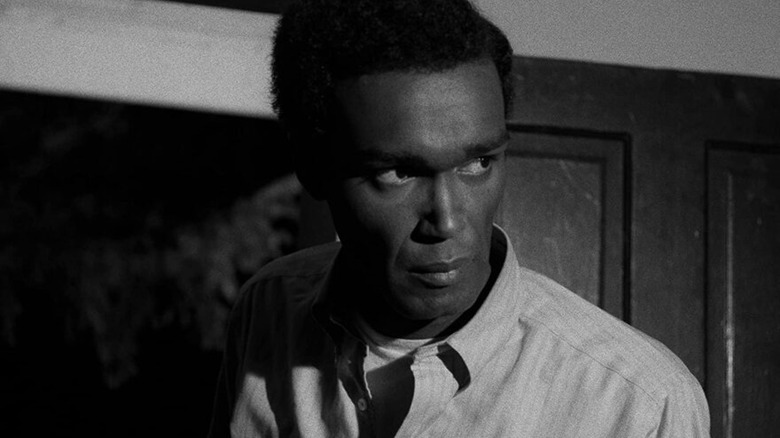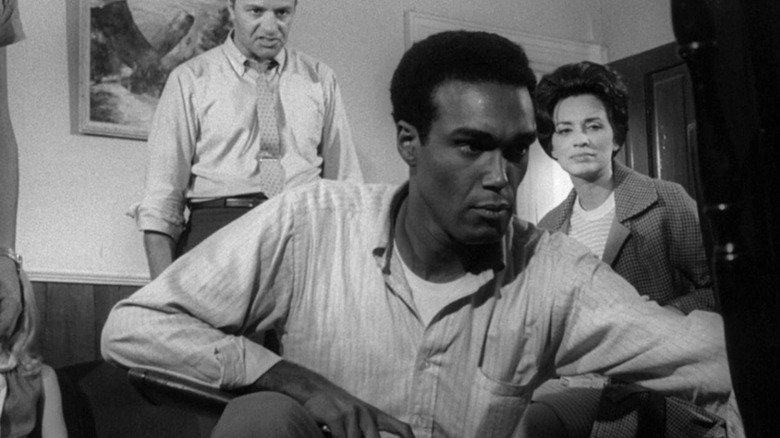Night Of The Living Dead's Duane Jones Fought Against A Happier Ending For The Film
George A. Romero's "Night of the Living Dead" was the blueprint for the zombie-horror genre we know and love today. Despite never using the word "zombie" in his 1968 directorial debut, Romero brought the shuffling undead to life while creating a tense atmosphere of dread that permeates throughout. Interestingly, all the human survivors in the film display spineless passivity save for one: Ben (Duane Jones), the only level-headed individual among the group, puts the human instinct for survival to good use in an intensely nightmarish situation. So, when Ben, the only Black person in the film, is mistakenly shot down by police officers while actual brain-eating zombies ravage the land, the ending feels like a punch in the gut, even 55 years later.
When Romero was looking to cast the core group in the narrative, he understood the importance of casting the right person for Ben, as this character formed the crux of the central conflict. While writer-actor Rudy Ricci was originally considered for the role (Ricci ended up playing one of the ghouls), Romero eventually hired Jones, an up-and-comer working in New York to make a living. The decision to cast a Black actor as the lead essentially changed "Night of the Living Dead" and the shocking nature of its ending, and Romero expressed the following sentiments about this casting (via The Wrap):
"Duane Jones was the best actor we met to play Ben. If there was a film with a Black actor in it, it usually had a racial theme, like 'The Defiant Ones.' Consciously I resisted writing new dialogue 'cause he happens to be Black. We just shot the script. Perhaps 'Night of the Living Dead' is the first film to have a Black man playing the lead role regardless of, rather than because of, his race."
A grim ending
When Jones came on board, he requested a few changes to Ben's character, including revisions to the dialogue to tone down the crude, volatile way in which Ben was supposed to originally speak. These changes were implemented along the way, and when an alternate, happier ending for the character was once considered, Jones actively fought for the grim, heartbreaking ending that "Night of the Living Dead" concludes with. He recalled (via The Wrap):
"I convinced George that the Black community would rather see me dead than saved, after all that had gone on, in a corny and symbolically confusing way. The heroes never die in American movies. The jolt of that, and the double jolt of the hero being Black seemed like a double-barreled whammy."
This deliberate subversion of expectations that Jones fought for ultimately deepens the layers of symbolism that the film expertly weaves. The story begins with Barbra (Judith O'Dea) being chased by the undead, and established tradition momentarily leads us to believe that she will claim the mantle of final girl. However, Barbra proves to be theatrical even in the face of danger, which is exactly when Ben bursts into the scene and takes charge of the situation. As the undead close in, Ben also has to deal with racism from other white survivors, including Harry (Karl Hardman), but he perseveres due to his bravery and calm pragmatism, proving himself worthy of being the final survivor.
However, all of that is undone in a single, horrible second when Ben is shot without hesitation and burned alongside the undead, subjected to bigotry-driven dehumanization even as the world crumbles due to supernatural reasons. This is a jarring final scene that makes a terrifying statement — one that is difficult to stomach but essential to reckon with.

